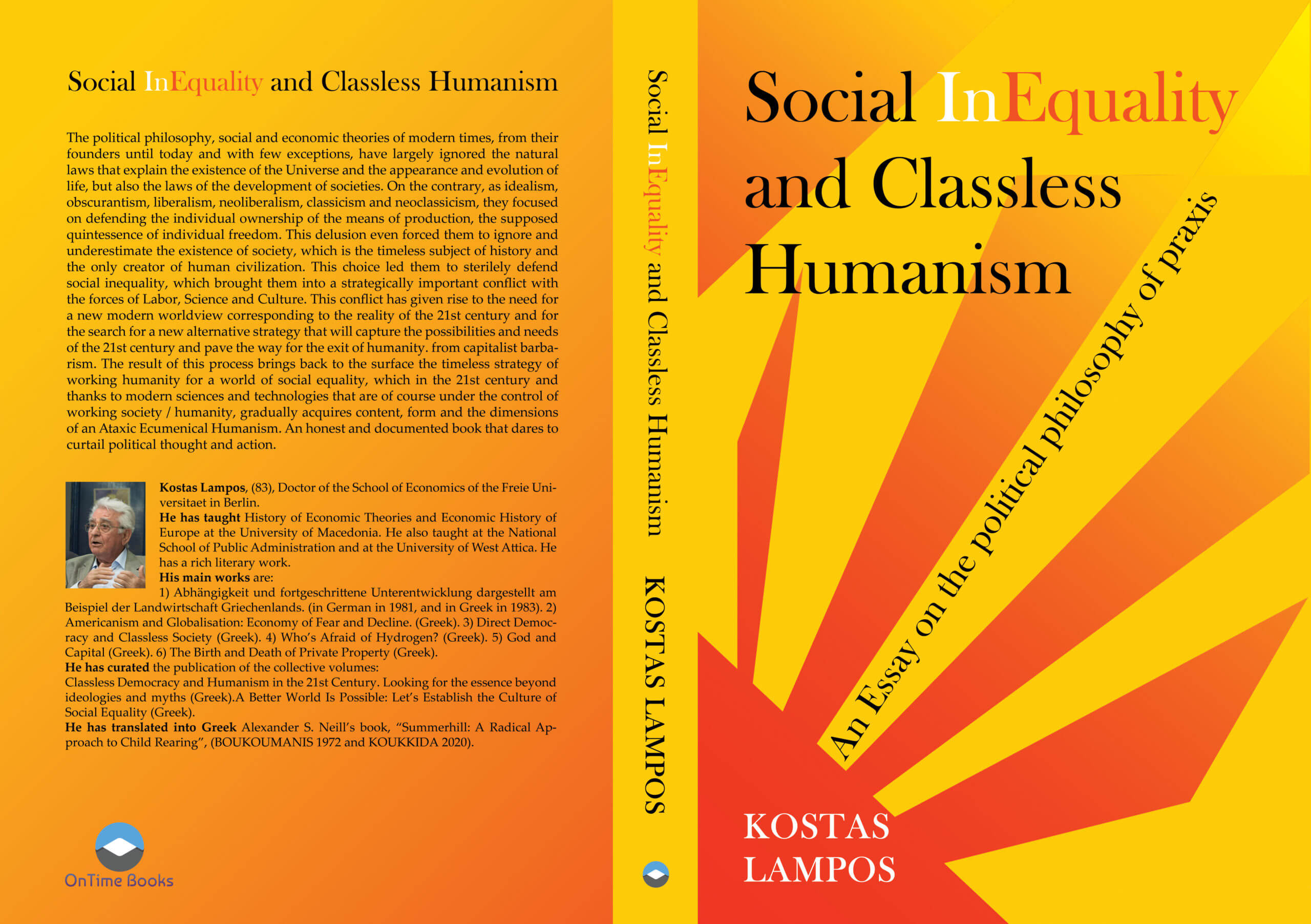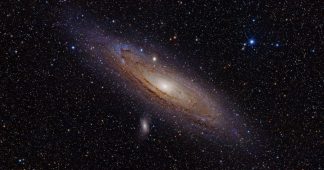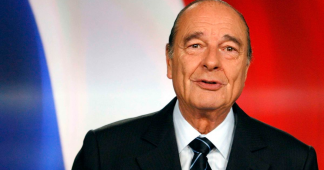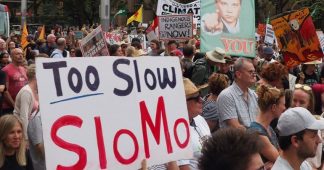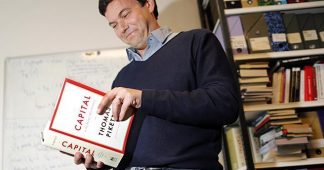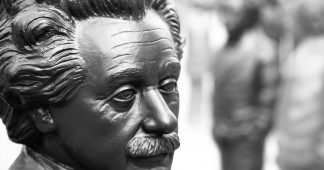An Essay on the Political Philosophy of Praxis
By Kostas Lampos
On Time Books, London 2021
https://ontimebooks.net/product/social-%ce%b9nequality-and-classless-humanism,
The political philosophy, social and economic theories of modern times, from their founders until today and with few exceptions, have largely ignored the natural laws that explain the existence of the Universe and the appearance and evolution of life, but also the laws of the development of societies. On the contrary, as idealism, obscurantism, liberalism, neoliberalism, classicism and neoclassicism, they focused on defending the individual ownership of the means of production, the supposed quintessence of individual freedom. This delusion even forced them to ignore and underestimate the existence of society, which is the timeless subject of history and the only creator of human civilization. This choice led them to sterilely defend social inequality, which brought them into a strategically important conflict with the forces of Labor, Science and Culture. This conflict has given rise to the need for a new modern worldview corresponding to the reality of the 21st century and for the search for a new alternative strategy that will capture the possibilities and needs of the 21st century and pave the way for the exit of humanity. from capitalist barbarism. The result of this process brings back to the surface the timeless strategy of working humanity for a world of social equality, which in the 21st century and thanks to modern sciences and technologies that are of course under the control of working society / humanity, gradually acquires content, form and the dimensions of an Ataxic Ecumenical Humanism. An honest and documented book that dares to curtail political thought and action[1].
Social Inequality as a ‘Philosophical’ Problem[2]
“Our philosophical pursuit does not just aim
at theoretical knowledge but also how to
put theoretical knowledge into practice.”[3]
Aristotle
We live on planet Earth, in an infinite world, the ‘Great world’, (Κόσμος ο Μέγας), in the Universe[4] which is not our creation nor, of course, a gambling non-being[5] that supposedly ‘rolls the dice’ and depending on the dice makes decisions about our life, or ‘laughs when people, societies and humanity make plans’ for a better world, but exists as a self-existent anarcho-infinite objective reality, which is subject to rigid natural laws and is in constant and complete order, while cellularly ‘dies and regenerates in moderation’[6]. In contrast to the ‘Small World’, (ο Κόσμος ο Μικρός), that is, the social reality that is constantly in disarray because the authentic written and unwritten laws of human society[7] are marred by the brutal violence of selfishness and by the authoritarian laws about individual property that disrupt societies into the 1% that plunders the planet, the unique homeland of us all, and the lives of 99% of the world population, wreckage of the epic primitive societies that managed to survive, as a human species, and evolve thanks to cooperation, solidarity, equal distribution and mutual respect. And as societies and humanity try every time to pick up their pieces and protect themselves from each given authority, the Microcosm, (ο Μικρόκοσμος) the invisible world, the world of the microbes and viruses pops up from time to time from a corner, or from a dark laboratory, which renders the ‘Small World’ incompetent, renders its laws useless, paralyses its supposedly invincible powers and decimates humanity by the millions with particular preference for the poor, the work veterans and the outcasts of power.
*
The ecstasy of the first humans, due to ignorance and natural fear, in the face of natural phenomena sharpened their imagination and their curiosity led them to seek interpretations. This perfectly normal state, expressed as a relationship between man and Nature, gradually brought through experiences answers that took the form of knowledge and awareness and, after a certain stage of evolution, they awakened the social consciousness of Us, in the sense of ‘I exist, I want and I can make my life better’. Through this social consciousness of self-knowledge and self-confidence, ignorance and fear were drastically reduced and the creative forces of primitive societies were liberated, which, from a point onwards, overcame the difficulty of survival, paved the way for science and created the conditions for a secure and happy life of all People, in conditions of society as a collective Whole.
Authoritarian and obscurantist clergies, in their attempt to dominate societies, have concocted the concepts of the metaphysical, the ‘sacred’ and the ‘divine’ which divert thought and logic from the real, the Here, the Now and the Everywhere and on them built a horrible, virtual, false world of the Hereafter, surrounded by idealistic/metaphysical philosophies, closed and thanatophile religions[8] of hatred with false ‘gods and demons’ as scarecrows, with millions of professional swindlers, hypocrites and false religious and many repressive mechanisms. It is a unique and solid truth that in this Little World we live in, nothing is accidental and this is because this world is the work of our action or inaction, our consciousness or ignorance and treats us accordingly as ‘chosen’ or as ‘pariahs’, as equals or unequal, as masters or as slaves.
*
So, in the 21st century, we ended up living in societies where only two concepts are haunting political philosophy, moving human history up and down, back and forth and left and right and determine our lives and culture. They are the concepts of social inequality and social equality, the first being the matrix of capitalism, bourgeois democracy, misery and war and the second being that of direct democracy, prosperity, peace and classless humanism. Both these concepts have become the nightmare of the ‘philosophers of opportunity’, the apologists and the ideologues of capital, in their futile attempt to justify social inequality and to rid social equality, that is, equality in life, in prosperity, in freedom, in happiness, with a thousand and one tricks and theoretical nostrums, but also to shrink hope, perhaps even more, the historical certainty of the forces of Labour, Science and Culture that a better world, a world of social equality is possible. However, as can be deduced from the unstoppable social fights and their unified intemporal strategy for social equality, this world is possible thanks to the unity of the potential historical development that also takes place in the dimension of continuous and unified space-time which is understood as a timeless arrow defined by the indestructible unity between past, present and future. And that is in defiance of the forces hiding behind dark myths and authoritarian ideologies and struggle with the tactics of ‘divide and conquer’ to stop the dynamics and shatter the unity of the ever evolving and historically defined social space-time which is in this period substantiated as the subject of social equality’s history and culture.
When all these distinctions end up in the spiritual blender of neoclassicism and neoliberalism, where the touch of the being, that is, the analysis of the real society of inequality, ‘is a matter for the specific science of sociology to interpret it’, while the proper, i.e. the desired, necessary and achievable society of equality ‘becomes a matter of the abstract philosophy’ of ‘the streets’ to introduce and map it, but always under the heresy of the obscurantist and authoritarian clergies and as a ‘preoccupation of romantics and dawdlers’. This approach is the deliberate degradation of social equality from a social to a supposedly philosophical problem, but also of philosophy itself from a matrix of search, research and science, of understanding and solving social problems to an idealistic trap, to a sterile authoritarian ideology of maintaining inequalities and dystopias. “Although the liberal bourgeoisie wanted a god, its god could not become active; it wanted a monarch, but it had to be powerless; it demanded freedom and equality but limited voting rights to the propertied classes in order to ensure the influence of education and property on legislation, as if education and property entitled that class to repress the poor and uneducated,”[9] obviously so as not to be involved in the affairs of power. Between these two approaches finds its way the fundamental lie, the central contradiction referring to the necessity of political management of the being, of the economic-social system, by the economically ruling class itself and its professional politicians because society is supposedly not capable of governing or self-governing. This timelessly predominant notion has its origins in Plato, who urged the class of major landowners and slave owners, to whom he himself belonged as well, to accept government responsibilities, otherwise they would have to be ruled by the incompetent and inferior to them with negative consequences for them. A notion that, instead of being abandoned over time and with the cosmogenic changes for the better that took place, festered resulting in some theorists, such as Friedrich August von Hayek[10] and his epigones, leading with the ‘Chicago Boys’ declaring society non-existent. In fact, some politicians such as Margaret Thatcher,[11] Ronald Reagan, Pinochet and many of their followers argue that there are only interests and individuals who however are not capable of managing their lives and all their interpersonal and social relationships and should therefore be forced to accept being ruled, always ‘with the help of their own god, by his own law and army’, by capital, through the mediation of a ‘national delegation’ that dances to the rhythms of the military-industrial complex, the economic oligarchy and political money.
The epitome of absolute, fascist, political totalitarianism that considered that ‘if reality does not agree with it, then so much the worse for reality’ is, as always, here. And yet societies exist, in fact as a stubborn, hard, timeless and evolving entity ‘with body and forces’, that is, with matter, spirit and energy, both as the ‘conscious part of Nature’ as defined by Newton and as a Whole, as a strictly structured existence, with material and spiritual power, steadily moving toward a better world, even when totalitarianism can at the same time fix it with lies, authoritarian fear and violence. Conservation, inaction and repression to increase and protect the individual/private wealth end up in chaos, exacerbate the internal contradictions, reveal the historical contradictions of capital and confuse its representatives and apologists. And this is because the ruling class doesn’t have a social, but a class/authoritarian consciousness, since consciousness and especially social consciousness is not something metaphysical, but “an empirical event,”[12] a magnitude that emerges from our experiences within and not outside or against the We as a society.
Thus, the “neoliberal philosophers”[13] who “serve their term” in government, state, business, academia and the media, “as base slaves of power,” are unable or obstructed to answer the simple, straightforward question that is not philosophical but vital to working society in the simple, clear and perfectly understandable formulation: Since social inequality is, as many of them accept, a kind of ‘curse’ for man and mankind, what is the element that once removed will take the oppositional IN of inequality, and let emerge equality, social equality, the society of equals, of dissimilar, different but equal, who are not the same, but can and should be socially equal to each other?
There is a specific reality constituting the timeless obstacle to the evolution of humanity in the culture of social equality and has to do with the fact that each power based its culture of social inequality, its own authoritarian culture, on the denial of natural order. They built their ‘civilization’ on the great lie about an ‘all-good, omnipotent and omniscient god’, about the ‘afterlife’, about the ‘immortality of the soul’, about the fetish of the ‘sacred private property’[14] as a fetish of themselves. These are deceitful myths with which the respective religious clergies cultivate the authoritarian fear, the fear of death, in order to reap the fruits of life together with the authoritarian clergy, marginalizing the respective forces of Labour, Science and Culture. It is a culture built on conscious lies, clothed with myths and armed with the fear of power. But all this is but a severe disturbance of the harmony between right thinking and objective reality, which ultimately leads to ‘philosophical impasses’[15] that strive to justify the economic and social impasses of capitalism. It is this obstacle that can and must be eradicated with the decolonialization of history and the moral death of all forms of power and social inequality. And this can happen with the re-foundation of natural philosophy, as a philosophy of flow, movement, and fight, and not of time’s stagnation, as a philosophy of evolution and as a philosophy of human things, and not as an ideology of powers and ‘divine scarecrows. As we see, the justification of social inequality, on the part of its creators and apologists, has no limits and no end, but its justification on the part of its victims can and must lead to its end, obviously starting with the words, the concepts and language that we did not create over the centuries just to communicate, but mainly to create useful things, to create ourselves as a species and of course to create an ever-better world. But pay attention to the concepts because they’re not only creative tools, since they can also be deadly weapons, so it is very important who, how, when and for what purpose uses which concepts.
We live in a world drowned in hypocrisy and lies, in violence and crime, in a world that stumbles in between ‘gods’ of all sorts and kinds, clergies of the Dark Ages and charlatanism, rulers and masters, self-appointed ‘authorities’ and vulgar populists and it is natural for us to lose the sense of proportion because all these ideological accoutrements displace us from our living space and make us see our world through their eyes and that is why we live in a gloomy world. It is time to tear down all the divine scarecrows and the symbols of power, anything and whatever fills us with illusions and deceives us, whether they are inside us or in the streets and squares and to see the world with our own eyes, as those from below, which means to see it from the bottom up and not the other way around. To see the hills and the mountains we have to cross, every robber and every Procrustes we will meet and we have to neutralize them in order to leave behind us the capitalist misery and reach a better world that is today both necessary and feasible.
It is, therefore, obvious that there is an answer to this non-philosophical question, but it is not given by the theoretical opportunists of mumbo-jumbo philosophy, the much-advertised neoliberal philosophers, the fake ‘left-wing political philosophers’ and the obscurantist and authoritarian philosophies/ideologies that legitimize and sanctify the conflicting individual ownership of the means of production and consequently social inequality. Obviously, this question will not be answered by capital either, as a class social relationship of exercising power of the few over the many, which breeds inequality. So, de facto, the ones called on to give the answer are the philosophy of social action and the timeless fight of the forces of Labour, Science and Culture, the real creators of wealth and culture, who fight for social equality on the daily.
Our capitalist era is decadent, infamous and dangerous and, as humanity is already heading towards the 21st century, with an unusual speed and complexity, envisions, seeks and strives for its passage to the next stage of its development with new content, a new meaning and a new form that will be defined by ‘everything in moderation’, that is, Man as I, as We and as a Species. But not as a conqueror and a criminal, as a hypocrite and a non-participant ‘holy man’, a ruler, and a ‘superhuman’ and of course not as a digitally ‘doctored’ and ‘post-human’. Therefore, as more and more of us will look for answers to the causes of inequality, poverty, injustice and capitalist barbarism, we will equally understand the conditions for the transition to a culture of social equality. So, to the same extent, all this will cease to be a ‘philosophical’ problem and will be treated by societies as a social problem, as exclusively theirs, whose solution will aim at the elimination of their primary cause, and of course not as a ‘trade-union’[16] issue of claiming subsidies, from their own usurped wealth by the various predatory elites. Only then and only in this way will our necessary self-confidence as We be acquired and the dialectical relation of the existence of society to itself, to Nature and to its very perspective will be established.
The memories and visions of the forces of Labour, Science and Culture, in the sense of working society as a Whole and as a Common of People, move – slowly and torturously, truth be told – in the direction of the arrow of time, in the direction of history, so the ‘philosophers’ and the professional ‘politicians’ should finally understand that the solution comes from the past and not from some future that does not yet exist. The only question that remains is when humanity will regain its spiritual freedom at great latitude and corresponding historical depth to definitively turn its history’s page from social inequality to social equality everywhere and forever. But turning the page of the history of mankind does not mean modernization of destructive capitalism, nor reforms of inequality, but conversion of inequality 1%> 99% to equality 99% = 100% -1%. which means the abolition of the matrix of violence, inequality, injustice, competition and war, of anti-social individual ownership of the means of production through social self-government, direct democracy within a classless ecumenical humanist culture.
[1] Presentation by the publisher on the back cover.
[2] A subchapter from the book.
[3] Aristotle (384-322 BC) was a Greek philosopher who laid the foundations for many sciences, such as: economics, physics, biology, zoology, logic, ethics, poetry, theatre, music, rhetoric, politics, etc. which as Aristotelianism constitute the first comprehensive system in Western philosophy and in world science.
[4] In reality, according to the current capabilities of science and technology, there is not just one Universe, but 10506 kinds of Universes that apparently move on the basis of the same physical laws.
[5] “No god and no man made this world, but it was always and is and will be an eternal fire, which burns in moderation and extinguishes in moderation.” Heraclitus.
[6] Astrophysics and cosmology inform us, by fully verifying Heraclitus, that thousands of new galaxies are born every day, meaning that parts of cosmic energy are converted into material systems, but at the same time thousands of deeply entropic galaxies also die, which means that some material systems are transformed into cosmic energy, phenomena that contribute to the perpetuation of the ‘mega-cosmos’ of the infinitely many Universes.
[7] By society, we mean a dynamic and evolving, independent, self-active and self-governed set of people, ideas, institutions, things, and situations, limited in its historical space, and therefore distinct from other sets, which has a duration in time. The members of a society are aware of their common historical path, constitute a single, homogeneous, independent, and organized set of people which gives them a special identity that claims its equal presence in the global community and the ecumenical culture.
[8] Just like the life of species, a scientifically and logically perfectly understood natural phenomenon, as a constantly differentiating self-organisation of matter and energy to the extent that it can reproduce, evolve and perpetuate itself as a species, death too, as a process of decomposition of self-organized matter, is the end of life on an individual level, a completely, scientifically and logically, understandable natural phenomenon and therefore any other interpretation that perceives it as a transition to an ‘eternal afterlife of the supposed eternal individual soul,’ is a scientifically and logically unproven assertion of idealistic philosophy and dogmatic religions which contains a deliberate, powerful and historically recorded deception of the obscurantist and authoritarian clergies for the purpose of intellectually, economically and politically exploit the working people, through ignorance, violence, and authoritarian fear.
[9] Schmitt, Carl, Political Theology, LEVIATHAN, Athens 1994, p. 97-98.
[10] Hayek Friedrich August von, The Constitution of Liberty, University of Chicago Press, 1960.
[11] Thatcher Margaret, «Hayek’s The Constitution of Liberty, this is what we believe», http://www.hayekcenter.org/friedrichhayek/qs-20th.html.
[12] Wittgenstein Ludwig, Philosophical Research, PAPAZISIS, Athens 1977, p. 161, et seq.
[13] Simopoulos Kyriakos, Intellectuals and Artists. Base Slaves of Power, PERGOLA, Athens, p. 11, et seq.
[14] For an in-depth analysis, see Lampos, Kostas, God and Capital. An Essay on the Relationship Between Religion and Power, KOUKKIDA, Athens 2015, p. 50, et seq. and 309, et seq.
[15] “One of the main causes of philosophical illness is the one-sided diet, when one feeds their thinking with examples from only one kind of life (and thought),” Wittgenstein Ludwig, Philosophical Re-search, ibid, paragraph 593, p. 195.
[16] The fact that trade unionism is a mediator between capital and labour and, as a rule, for reasons of self-preservation as a capitalist institution and as a bureaucracy in the service of capital is shown even today in the big declining crisis of capitalism by workers refraining from trade unions, who sometimes go so far as to label the ‘workers’ representatives’ as their ‘enemies even fiercer than the capitalists,’ as happened at the Workers’ Conference a hundred years ago, at the height of the trade union movement in London on 11 March 1920.
We remind our readers that publication of articles on our site does not mean that we agree with what is written. Our policy is to publish anything which we consider of interest, so as to assist our readers in forming their opinions. Sometimes we even publish articles with which we totally disagree, since we believe it is important for our readers to be informed on as wide a spectrum of views as possible.
